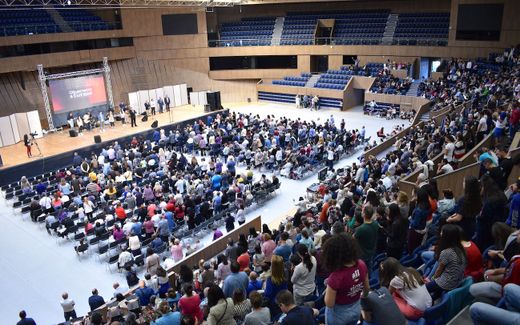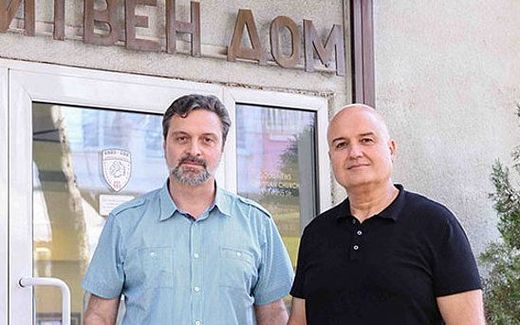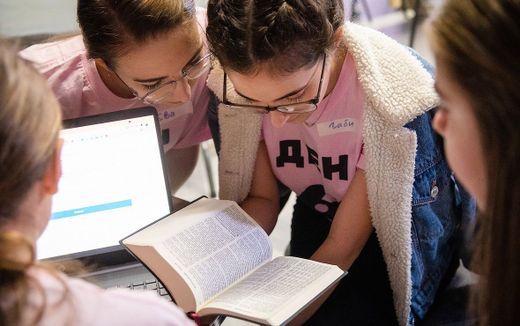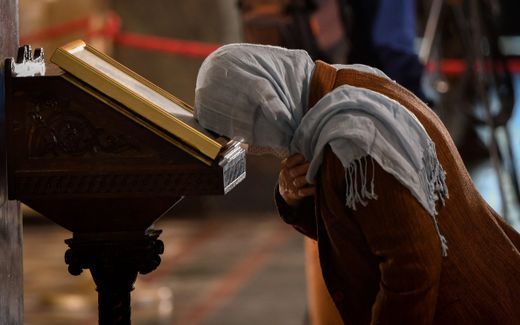Same-sex marriage leads to split among Bulgarian Methodists; pastor looks back
16-09-2023
Eastern Europe
Gertrude de Wildt-Brouwer, RD
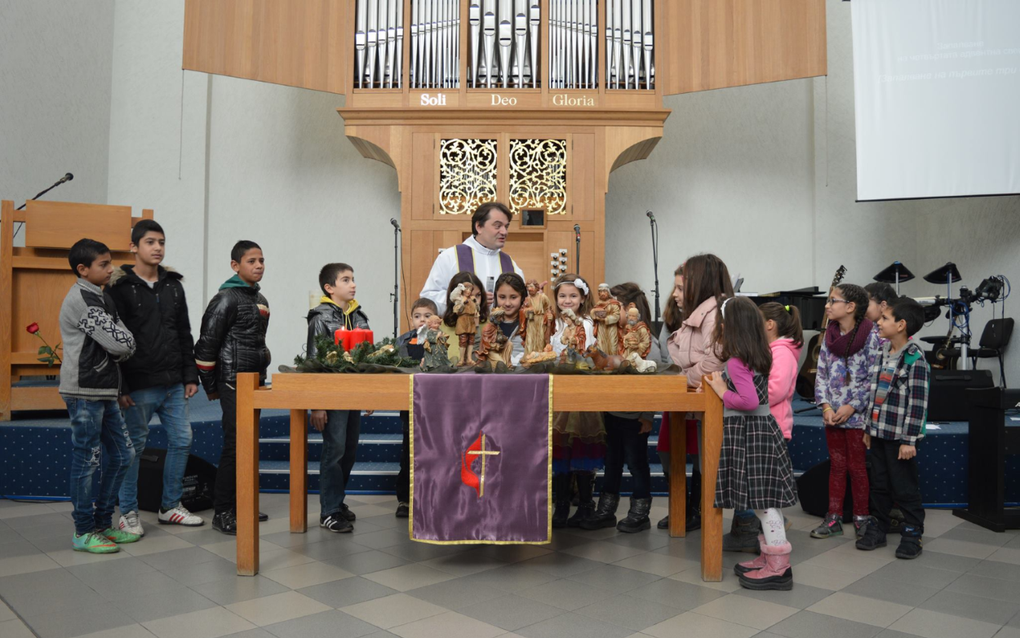
Pastor Daniel Topalski in his church. Photo X, Daniel Topalski
Eastern Europe
Yes, he is a dog person, but he has two cats: an Orthodox one and a Methodist one. "The Orthodox one doesn't need anyone. But the Methodist one is still open to discussion," says Bulgarian pastor Daniel Topalski. He recently experienced a split in his own church: the United Methodist Church. He is less keen to joke about that.
Topalski grew up in Pleven, a city in northern Bulgaria. "I don't come from a Christian family. But through my grandfather, who was a cook in an Orthodox seminary, I got to see some Christian reading from time to time. I am a curious person, so I read that. In 1991, in my final year of high school, I came into contact with Christians and attended a Pentecostal church for the first time. The simple message of repentance, conversion and salvation touched me. It was not a great transformation in the sense that something totally new revealed itself to me. But that message was all I needed."

In 1991, Bulgaria had been free from the official communist regime for two years. "It was not such a big change in our country. The people in power before were still pulling the strings behind the scenes."
Communists
In Bulgaria, the Orthodox Church is the oldest church with the most power. In addition, Methodist missionaries were active from the 19th century onwards. They founded congregations mainly in northern Bulgaria. Their churches were built in the centres of various cities.
"Such was the case in Pleven, my hometown. When the communists came to power in Bulgaria in 1944, they immediately demolished many Methodist churches or reallocated the buildings. However, the Methodist church in Pleven was allowed to remain because Georgi Dimitrov, prime minister and Communist party leader, was married there. The church's cross was also preserved. Under communism, the church in Pleven became state property and was used for a puppet theatre."
Daniel Topalski
Daniel Topalski (48) is a pastor in Varna, a Bulgarian city on the Black Sea coast. He grew up in a non-Christian family but came to faith at 17. He studies law in Veliko Tarnovo. Topalski works for a period as a legal adviser to the United Methodist Church in Bulgaria. During this time, he presides as a lay preacher. He later studied theology and was confirmed as pastor and superintendent of Bulgaria in 2011. Topalski is married and has a daughter.
Topalski joins the Methodist church after his conversion. He studies law and becomes active as a legal adviser to the church. In this position, he manages to "reclaim" the Methodist Church of Pleven so that it is once again used for its intended purpose: service to God.
Theology
Besides his legal work, he is active as a lay preacher during this period. He decides to study theology. He pursues his education at an Orthodox seminary in Bulgaria. He also takes a distance-learning course at the Methodist Academy in Germany.
In 2011, he was confirmed as a pastor. From that year, he is also superintendent of the United Methodist Church in Bulgaria, a position under the bishop in the Methodist hierarchy.
Becoming a Methodist in Bulgaria is not an obvious choice, Topalski says. "It is a small church in our country. Becoming a Protestant here is an exotic choice anyway. And you really have some explaining to do when you tell people you are a Methodist."
While studying at the Orthodox seminary, he sometimes experienced the Orthodox's condescending attitude towards other churches. "A lecturer said, 'Ecumenical meetings organised by Protestants are funny. They pay to be criticised by us.’"
Priest
What appeals to the Bulgarian in the Methodist movement is its commitment to society, especially to the poor. "With the Orthodox churches, you have to come to the priest. With Methodists, the pastor comes to you. It is practical piety that we practise, also in our ministry among the Roma. The best thing we can do for them is to establish churches within their communities. These have a very edifying function."
Topalski finds the practice of the Lord's Supper within the Methodist movement valuable. "The Lord's Supper is God's means of grace that He uses to make us more holy. John Wesley administered it three to five times a week. In our congregations, we have the Lord's Supper every Sunday. The meetings are not ministry of the Word only but of Word ánd table."
Marriage
Topalski now heads the Bulgarian Methodist churches. These have 1,250 members on paper, but in reality, more people attend services. "That number doesn't say that much. Communism has made people reluctant to join; they associate it with divisions and danger." There are 24 congregations and 18 pastors in Bulgaria, three of whom are emeritus.
Around the world, traditional congregations within the United Methodist Church are experiencing less and less space for their traditional views on marriage in recent years. A key meeting in 2019 votes to tighten the ban on same-sex marriage. This is against the expectations of the liberal flank, which does not agree with the tightening. Traditional congregations decide to leave the UMC and unite to form the Global Methodist Church (GMC).
The Bulgarian congregations transition as a whole to the Global Methodist Church in 2022. Topalski: "Where homosexual practice in the UMC was first allowed with a blind eye, in recent years, it had to start being celebrated." Ironic: "Some people with a deep understanding of Scripture suddenly saw that the church had been wrong for thousands of years."
Sale
In Bulgaria, where all congregations are separating from the UMC, the transition to the GMC concretely means that Methodist churches lose a lot of income and have to sell properties. As an example of how that hurts in some areas, Topalski cites the sale of the rectory of the Methodist congregation in Pleven. "It was the house where my wife and I lived, the congregation where we got married," he says.
"Yes, it was a difficult year," Topalski sighs. "But it would have been more painful to stay in the UMC and compromise. Marriage is a creation thing. It is the DNA of the church. We must not give that away. Fortunately, we are experiencing worldwide support from our brothers and sisters from the Global Methodist Church."
Topalski and the other Bulgarian Methodist pastors now face the task of finding new sources of income to maintain their buildings and support the pastors. This is quite a turnaround, which is not just about finances. "Our Bulgarian congregations never had the sense of responsibility, of ownership. For a long time, we thought we were poor. But God gives each one what it takes to live a godly life. We should focus on what we have, not on what we need. God will provide."
In this process, Topalski also likes to turn to the founder of Methodist churches, John Wesley. "He had a three-pronged approach: 'God works so you can work,'" he says. "God works, so you must work." "If you don't work, God will stop working." Topalski, therefore, likes to reach out. "We know the story of the widow with two pennies. Even with limited resources, we will continue to serve Him."
Methodists, followers of Charles Wesley
Methodists are followers of English revivalist preacher John Wesley (1703-1791). As an Oxford theology student, he founded the "Holy Club", a group of young men who wanted to live holy before God.
Wesley works for a time as a missionary among Indians, but with no visible results. Back in England, he learns grace through Luther's writings. This is so liberating for him that he sets his further life in passing on that message. Wesley's brother Charles (1707-1788) supported John's ministry by writing over 6,000 hymns.
From the moment his life changed, John Wesley criticises the elitist Anglican Church for its high-church character. He appoints lay preachers, not only men but also women.
Wesley is deeply moved by poor people. "Christianity is, in its essence, a social religion. Those who turn it into a hermit religion destroy it," is a statement that typifies him. He fights social ills such as child labour, exploitation and slavery.
A key doctrine of Wesley is the belief that a Christian can grow to perfection in love of neighbour. He rejects the doctrine of election.
Methodism grows into an important movement even during Wesley's lifetime. It is also popular in America. The links with Moravian brethren and with other revival preachers, such as George Whitefield, give Wesley's ideas a wide entrance.
This article was translated by CNE.news and published by the Dutch daily Reformatorisch Dagblad on September 11, 2023
Related Articles


